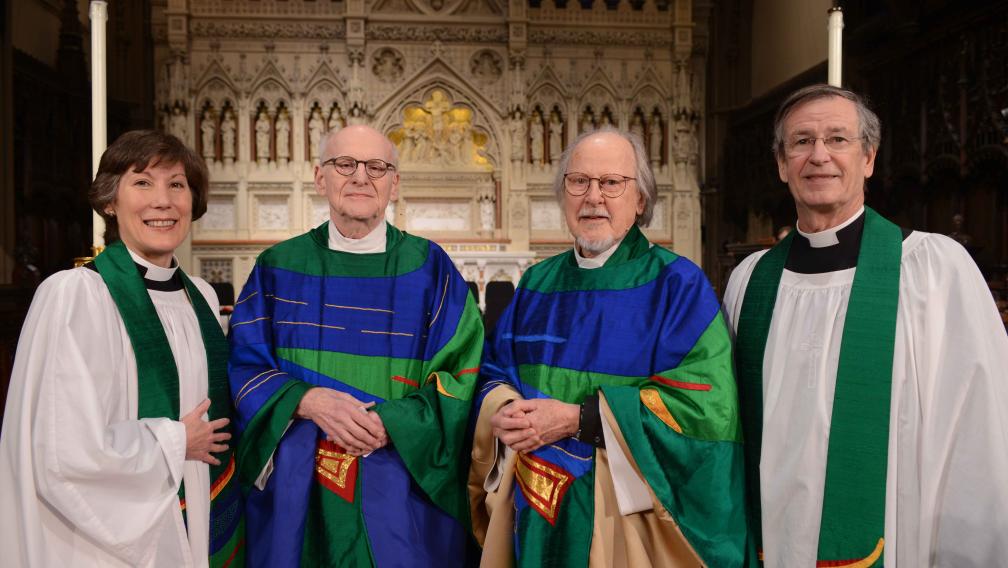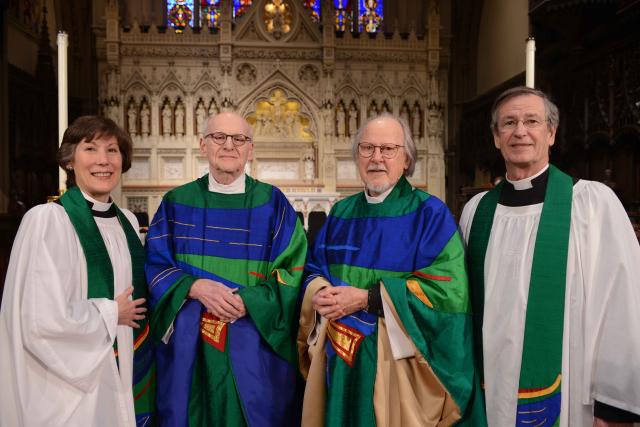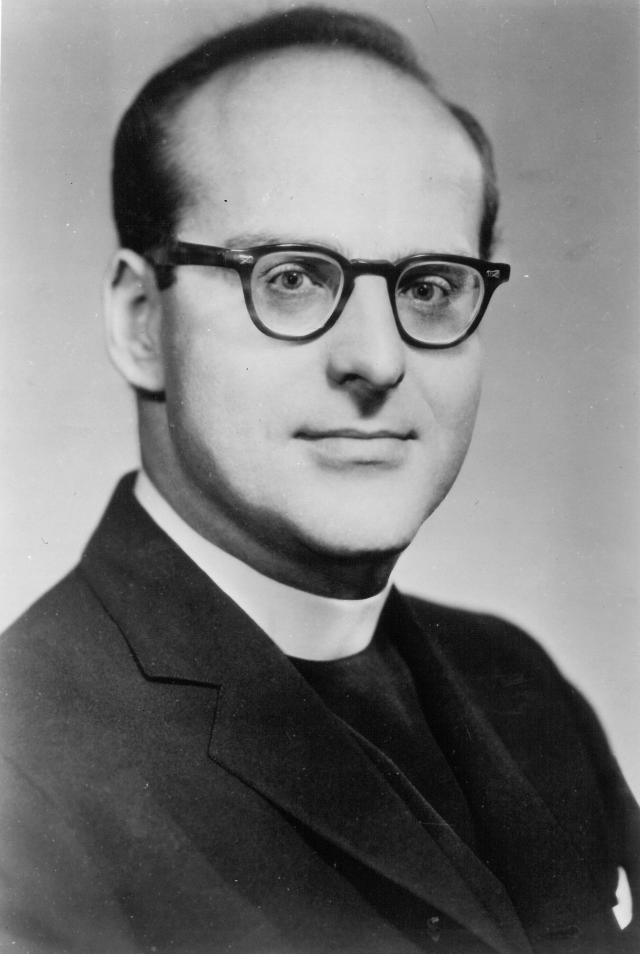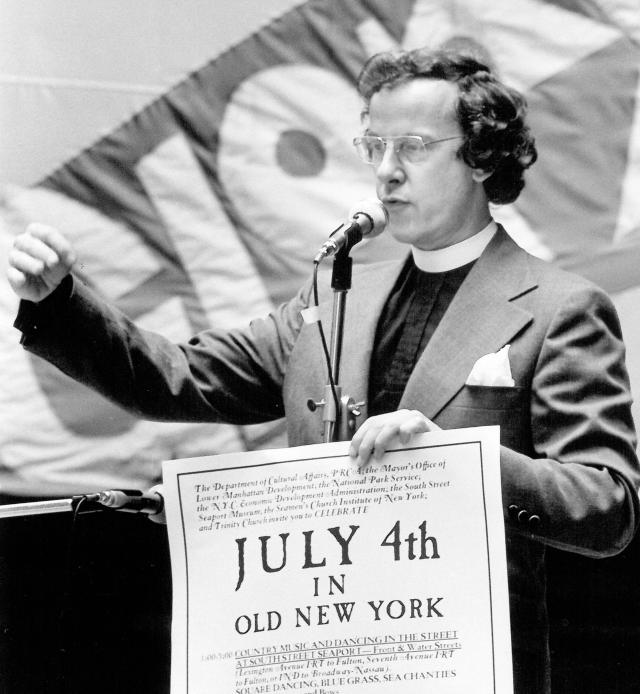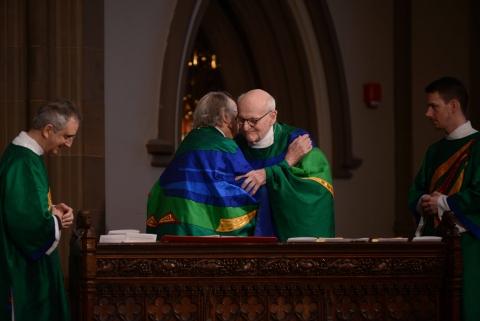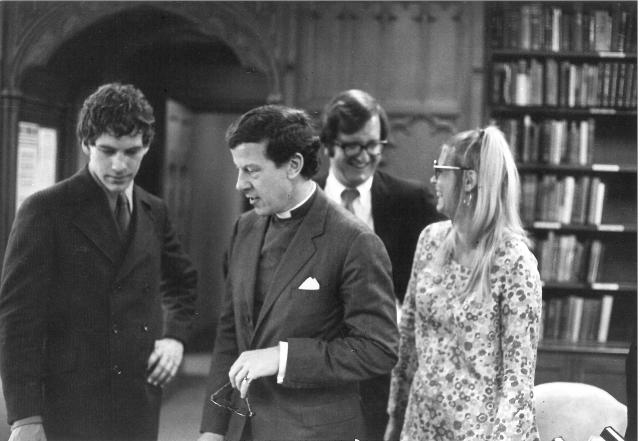Sixty years ago, William Norgren and John Moody were ordained into the priesthood. On a recent Sunday, they celebrated the anniversary of their ministries, and the Eucharist, together in Trinity Church. After six decades of service, they shared a little of what they’ve learned through the years.
The Rev. William Norgren: The Path Toward Unity
When Norgren was ordained in 1953 at the Cathedral of St. John the Divine, he thought he would enter parish ministry.
Instead, after getting his Masters of Divinity at General Seminary and doing graduate work at Oxford, he became the director of Faith and Order studies of the National Council of Churches, beginning a long career in ecumenism.
“The main highlight of my career has been the friendships I’ve formed across the lines of the different communions,” said Norgren. “These friendships demonstrated to me that despite all of the differences or diversity between the major communions worldwide there is this ninety-five percent agreement in the basic Christian faith.”
The National Council of Churches is an ecumenical organization that included 33 (now 37) orthodox and protestant denominations. Norgren worked there during the Civil Rights Movement, and observed the churches coming together in new ways.
“They saw the need to work together on civil rights issues and make a Christian witness that’s more united than they were accustomed to doing. And they did make a major contribution.”
In the 1960s, Norgren spent three years in Rome where he was invited to participate in the Second Vatican Council as a guest observer, and he worked as the Ecumenical Officer in the Episcopal Church. He’s seen a change as denominations move from antagonism to friendship.
“Friendship changes attitudes,” he said, “so that you can see this as a phase on the way to greater unity.”
Although he’s seen change in attitudes, he knows that historical change is a long process.
“We cannot accept the status quo ecumenically. We’ve made progress. But to make that the end would be a grave error. I believe you’d be fighting against the Holy Spirit.”
When asked what his advice for young priests or Christians might be, he said, “Christ made it clear that love is the greatest thing, and of course human beings fail in love a great deal. So do priests and theologians. So I would think the elevation of Christian love is the main thing for all our lives.”
The Rev. John Moody: Art and Faith
Moody was ordained in Columbus, Ohio, where he helped establish The Church of St. Edward the Confessor, which grew very quickly as the population increased in the area, and even became a training ground for young priests.
After 15 years, Moody took a sabbatical and obtained his master’s degree in visual arts at NYU. The arts have been an important part of his ministry and life ever since.
“The arts push the edge of our perceptions,” he said. “They push issues in a way that help us to confront them and live within them. Faith does this too, and in each of our individual faith journeys we’re pushing the edges of our own perceptions trying to struggle for truth and wholeness.”
Moody was invited to come to Trinity in 1968 to “open the doors more widely to Wall Street.” He started a Weekday Ministry (where Norgren also worked for a time), with the help of Larry King, the Director of Music. They held summer festivals, hosted the performance arts, music, and drama, and eventually opened a coffee house called 74 Below, which was housed in the basement of Trinity’s office building at 74 Trinity Place.
Since then, his experience includes launching an arts ministry at Old St. Paul’s in Baltimore, serving as the Rector of St Paul's-on-the-Hill in Ossining, New York, working as Director of Program at Manhattan Plaza, a large public housing complex for artists and the elderly in New York City, and developing an Interfaith Chaplaincy at the Village Center for Care. He returned to Trinity as Pastoral Associate before retiring in 1991
After he retired, Moody focused mainly on his painting. He became involved at Trinity again after the terrorist attacks on September 11, 2001, working with EMS and participating in the Interfaith Chaplaincy program for first responders during the recovery. Since then he has become an active member of Trinity, especially involved in the Congregational Arts.
“I feel so blessed in my years and my ministry,” said Moody. “It’s all grace. So many good things have happened and so many dark times I’ve been brought through—it’s a blessing.”
Looking back on his career in the Episcopal Church, he notes that the church has grown in its acceptance of women and the LGBTQ community in the life of the church. He, like Norgren, acknowledged the church’s openness to other faiths.
“We’re reaching out to world religions in seeking common goals and objectives and hopes. It’s a wonderful thing,” he said.
Thinking back on his own relationship with David, his partner of 37 years, who died six years ago, Moody said, “It’s that love shared in life that God’s presence really strengthens and clarifies.”
When asked what his advice would be to young people of faith, he said, “Trust the love that you’re discerning in your life. That’s God’s presence within us; that’s eternal life that we discern and touch and hope for. Love is God's presence and grace in our lives."
